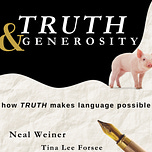Click here to find out how all this subscriber stuff works.
You can customize which topics within this newsletter you receive by visiting your account at any time. My regular posts will continue to be free.
We appreciate your support! Thank you!
Take the last poll!
PART I
The Principle of Generosity
Not included in audio.
In this section, we will see how the principle of generosity operates in ordinary, everyday language and how its absence affects our ability to communicate. We compare everyday language to poetry to show how figurative even the most ordinary speech actually is, despite common misconceptions about language. Finally, we will show how generosity drives semantic change, thereby preserving our ability not only to speak the truth, but to say anything at all.
1
The Principle of Generosity
Included in audio!
IF WHILE WALKING DOWN a city street we overheard someone say, “Fiona put the pig in the pen,” we could take the words in what might seem their ‘normal’ sense, or we could interpret the remark to mean she put the pig in a writing instrument. Properly speaking, there is no single normal sense of the word pen. Nor is there any meaning that is obviously the most common. Nothing about its pronunciation or spelling gives any indication of which is meant. The word is straightforwardly equivocal; in other words, it has at least two perfectly normal and equally proper dictionary definitions. And yet, something like the decision to take the word as meaning enclosure for animals is made, and it happens nearly as soon as the sentence is heard. Maybe even before; the word pig may automatically dispose us to consider only the pertinent meaning of pen.
Of course, in this sentence it would be perverse to assume the word meant fountain pen—a joke, at best, at worst an annoying act of small-mindedness. But why? What makes one meaning immediately obvious and the other a tedious joke?
It might be thought that the context makes the meaning clear. But the context alone forces nothing, for it, too, must be interpreted. Of course, there are different kinds of context that can affect meaning (which we will discuss later), but to understand, Fiona put the pig in the pen, the sentence is all we need to choose the meaning enclosure for animals over writing instrument. When reading the sentence, the pig is in the pen, it would be odd if it even occurs to you to wonder whether the word pen means writing instrument.
Because freestanding words in natural language are often too ambiguous to be useful, it is the sentence itself that tells us how to take the word’s meaning. This is what we might call an organic or holistic relationship in which we interpret words in such a way so as to yield a whole that, as we say, makes sense. For declarative sentences, this means interpreting the words in such a way that the sentence is, is likely to be, or at least might possibly be true according to our beliefs at the time. This brings us to the connection between truth and meaning on which everything here depends.
It comes to this: Given our beliefs about pigs and pens, Fiona could not possibly have put a pig inside a writing instrument, so pen must be taken to mean an enclosure for animals. Pigs don’t fit inside writing instruments—such an assumption is so mundane we are probably not even aware of making it. In interpreting ambiguous sentences, all else being equal, we choose the possible over the impossible, and the likely over the unlikely—that is to say, we choose what is most likely to be true. The command to interpret the sentence so that it ‘makes sense’ is just the command to interpret it so that it is most likely to be true. Thus we come quickly to the principle of generosity, which tells us that, all else being equal, we attribute to the words of any sentence the meanings that are most likely to make the sentence true.
We can, of course, imagine a different scenario in which the correct interpretation of the sentence would be far from automatic, even difficult. Suppose we are talking about fountain pens—our favorite types, their superiority to ballpoints, and so on—and you suddenly say, “Fiona put the pig in the pen.”
Then I, thinking we are still on the same subject, ask, “What?”
And you, distractedly, reply, “She put the pig in the pen, but I forgot to tell her about the feed.”
And I ask, “What pig? What are you talking about?”
And you answer, “The pig at my farm. I just remembered I had Fiona put it in the pen but I forgot to tell her where the feed was.”
In this conversation, different contexts and interpretive principles conflict with one another. Initially we are guided by what we might call the principle of coherence. We assume what is being said is relevant to what we were talking about just then, which leads us to the bizarre idea of Fiona putting a pig in a writing instrument. But this interpretation conflicts with the principle of generosity. All else is not equal, and so we are confused and the conversation teeters at the edge of breakdown. It requires a bit of effort to clear things up. You tell me, in effect, that the principle of coherence is not applicable here and that the principle of generosity should be allowed to determine the matter. Communication is then restored, although I may be irked or amused by your dreamy way of talking.
Of course, we could imagine a scenario in which pen in the very same sentence really does mean writing instrument. Suppose we are playing a game called Find the Pig which involves hiding teeny tiny plastic pigs and telling others where to find them. In that case, the pen in Fiona put the pig in the pen would clearly mean writing instrument. But this does not gainsay the general point about the principle of generosity. It simply clarifies how, in other circumstances, the same principle gives different results.
The principle of generosity is not the only principle that guides interpretation, but it is an absolutely essential component in understanding equivocal language. This does not mean that the most generous interpretation is always correct. It only means that all else being equal, and there is usually much else, the generous interpretation is the most likely.
Although the principle of generosity can be explicitly formulated and we can consciously adopt it and make it something of a moral obligation to extend it as far as possible, perhaps as an act of courtesy, similar to the way some anthropologists interpret foreign cultures and some scholars interpret books, my point is not that there is any conscious act of kindness here, nor that we have any obligation to be generous. The generosity I am talking about is not optional. Consciously or unconsciously, whether we ought to employ it or not, we simply must and do use it in order to understand language. Without it, communication through the equivocal medium of natural language would not be possible.
If this seems an exaggeration, perhaps that is because we do not normally notice how much equivocation characterizes all natural languages. In our example we only discussed two possible meanings of the word pen. But consider the following:
Let’s send the criminals to the pen.
The pen is mightier than the sword.
I hope to pen a letter soon.
Consider the meanings of pig in the following sentences:
The pigs came down on us in a fury and broke up our peaceful demonstration.
Put the pig back in the furnace, heat it to 900 degrees, and mix it with more raw ore.
He was a pig at dinner.
Consider put in the following sentences:
He put a false interpretation on events.
He put his house in order.
She put the shot high in the air.
Put your money where your mouth is.
They put the time at 5 PM.
She put it rather bluntly.
They put the question to a vote.
He put it to music.
Consider in in the following sentences:
He was hit in the head.
She’ll be ready in ten minutes.
They were put in charge.
He paid in cash.
Not in my opinion.
You’re in for a big surprise.
Virtually every word in the pig-pen sentence is equivocal. The possible combinations and permutations of even the most standard meanings of these few words produce a bewildering minimum of 500 interpretations of the sentence, each of which is equally legitimate so far as a strict decoding process goes. Thus it seems clear that a constant unconscious use of the principle of generosity is at work in almost every bit of natural language communication.
This conclusion can be avoided only by finding another principle of selection. I can think of only one contender, which I will call the principle of normalcy. Such a principle would say that there is a default or normal meaning of any sign, where normal would be taken to mean most frequently employed. This principle is especially appealing when, for example, correctness requires us to choose what seems to be the ordinary meaning of put over its rarely used, highly specialized meaning in Olympic athletics.
But it is obvious that we do not go by the rule of normalcy alone. If that rule led to a blatantly untrue or nonsensical meaning, and if there were less common meanings of the words that did not, we would automatically search among the latter for a better interpretation.
There are other, perhaps equally serious, problems with the principle of normalcy. Often there is no perceived difference in normalcy between two meanings or it is unclear what the normal usage is. Is it the most frequent? In the case of the word in, we might think its most normal meaning is spatial or locational—after all, this is the meaning that comes first in both the Oxford English and Merriam-Webster dictionaries—though very likely its most frequent meaning is metaphorical. But then we have to figure out which metaphorical meaning is the most normal or common. I do not doubt that there is a principle of normalcy that plays an important role in the interpretation of equivocal language, but it clearly operates only in conjunction with the principle of generosity. One of the conclusions we can draw from this, not one stressed by Davidson, might seem implausible at first glance: If the principle of generosity works here as claimed, then it looks as if the principle operates constantly and unconsciously in all linguistic communication.
I have spoken of what goes on in interpretation as if the process were an elaborate cognitive interpretive mechanism, but this must itself be taken in something of a generous spirit. Conceivably the principle operates more as an attitude than a method, or perhaps there are other mechanisms. It makes no difference to me; I find it useful to speak as if the principle were a matter of cognition, even if it is not literally true.
What I have said thus far is that ordinary language is highly poetic, metaphorical, idiomatic, figurative, and eccentric in a wide variety of ways, such that even the simplest words turn out to be equivocal and in need of interpretation. While there may be other principles at play, none of these alone is sufficient in interpreting natural language; the principle of generosity is always required.
Table of Contents
What do you think?
Most of this book was written over 20 years ago, but since then, interesting language learning research is being carried out today. Our current AI language models operate on huge data sets which far exceed what a child encounters, require feedback and correction from humans, and yet they ‘hallucinate’ and produce inhuman errors. This would seem to indicate something more is needed, that innate conceptual knowledge or something like ‘common sense’ underlies human language acquisition. Is it possible to create AI that truly communicates and understands language the way we do?










Share this post